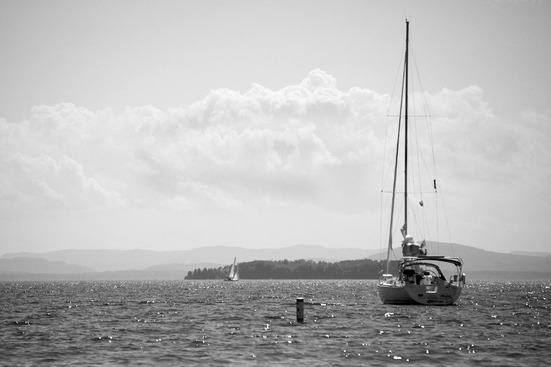What I learned on my summer vacation
 They say travel broadens the mind until you can’t get your head out of doors. (“They” in this case being Elvis Costello, but you get my point.) I’m not a world traveler but even a brief sojourn to a place not so far away can prove to be a much-needed tonic, and can set my mind to thinking about what it would take for the place I live to be as enjoyable as the place I was visiting. In this case, we spent a week in Burlington, Vermont, at the city’s campground and beach on the shores of Lake Champlain. It’s a short stroll to the beach, an easy (and popular) bike ride into town, and there’s barely any need to get into a car for the week.
They say travel broadens the mind until you can’t get your head out of doors. (“They” in this case being Elvis Costello, but you get my point.) I’m not a world traveler but even a brief sojourn to a place not so far away can prove to be a much-needed tonic, and can set my mind to thinking about what it would take for the place I live to be as enjoyable as the place I was visiting. In this case, we spent a week in Burlington, Vermont, at the city’s campground and beach on the shores of Lake Champlain. It’s a short stroll to the beach, an easy (and popular) bike ride into town, and there’s barely any need to get into a car for the week.
Burlington always seems like a bit of a paradise. It’s a very small city (less than half the population of Albany) with a strong local economy, a bustling downtown, a good arts scene, a strong connection with its college population. It’s a city that invests in its infrastructure and understands that the waterfront, extensive bike paths, and boating access draw visitors and keep things going. There also seems to be a culture of politeness and order, where cars actually stop for pedestrians in crosswalks and wave bikes through, and where old ladies are unafraid to ride their bikes on major roads.
Here are the things I found most enjoyable in Burlington and can’t understand why we can’t have in Albany:
- Cars and bikes, getting along. There are LOTS of bikes in Burlington. Lots. What makes it so bikeable? Yes, there are some good paths and lots of places to lock up, but ultimately what makes a city bikeable is that it is safe to bike. There aren’t a lot of dedicated bike lanes there. It just seemed that drivers, many of whom must also bike, were not just tolerant of bikes, but actually pleasant toward them. In addition, cyclists seemed to do their part — I saw a lot of predictable riding, obeying signals, staying on the proper side of the road.
- Glass on the roadside. I saw none. Well, there was one unsmashed airplane vodka bottle, which I kicked into the gutter as I rode by. Otherwise, I didn’t see a single instance of broken glass. Riding almost anywhere in the Capital District, you’re guaranteed to find the roadside strewn with glass. I also found Cleveland to be glass-free, and parts of Delaware, and parts of Pennsylvania . . . in fact, I’m starting to believe that it’s only around here that riding over glass is a constant hazard. Either people in other places aren’t tossing bottles out their windows (in my experience, at cyclists) as often, or someone is cleaning it up, or both. In either case, it’s both nice to know that a glass-free life is possible, and depressing to find that we’re pigs around here.
- When people step into crosswalks, drivers stop. In fact, drivers often stop even before you’re in the crosswalk, or before you’re even ready to cross the street. It got a little annoying, though not nearly as annoying as standing in the middle of North Pearl Street, pointing at the “Stop for Pedestrians” sign in the middle of the street, and having drivers completely ignore you and/or try to hit you. Seriously: just because you’re in a car doesn’t mean you’re more important, in more of a hurry, or anything else. Why does no one consider that sometimes they’re pedestrians who would like to cross the street, too? I think it has to do with suburbanization and the cultural loss of the need to parallel park or walk more than 15 feet to anything.
- There was a huge athletic community. I saw more runners, cyclists, rollerbladers, skateboarders and everything else in twenty minutes on the bike path there than I would see sitting all day at the Corning Preserve. No exaggeration. I know that our area is vastly more spread out (which is of course part of the problem), but it is not possible to visit Burlington without thinking that it’s a place where athletes are welcome and encouraged. And by athlete, I mean anyone who was out there doing it; it wasn’t all or even mostly skinny people with Gu bottles hanging from their belts — there were plenty of people who wouldn’t fit the stereotype who were out there getting it done. And ultimately, that’s what happens when you encourage athletics — people who don’t think of themselves as athletes give it a try, and keep at it, and ultimately they’re healthier, and that’s better for society. I feel like in Albany there are a couple of events where big groups come together, and then they all go back to wherever it is they run or bike or whatever the rest of the year.
Could we have these things in Albany? I just can’t see why not.
